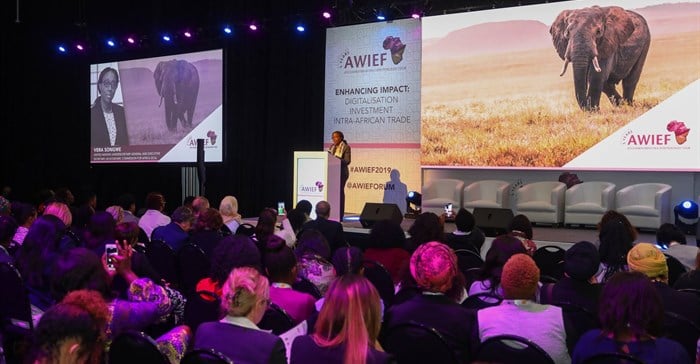A resolution taken at the annual Africa Women Innovation and Entrepreneurship Forum conference, calls on the economic empowerment of women to be linked to the Africa Continental Free Trade Agreement (AfCFTA).

AWIEF conference 2019.
The resolution was proposed by South Africa’s Wendy Luhabe, economic activist and the founder of the Women’s Private Equity Fund and co-founder WINDE, who led a rallying call to all the women leaders, businesswomen and women entrepreneurs present at the conference, to move beyond conversations to radical action.
“Women do not get invited when nations are going through transitions. We have to make a space for ourselves,” Luhabe stressed.
In a panel unpacking the implications of AfCFTA, she pointed out that Africa’s problem is that it produces what it doesn’t consume; and consumes what it doesn’t produce.
“I’m hoping AfCFTA will create industries that produce products we want to consume. The reason we have such low levels of employment in South Africa, is because we import what we need. We need to look at how to use this trade agreement to build our economies. We have resources, we have human capital, but we have not leveraged it to our benefit.
“This is an invitation and another opportunity for us as women to look at how we can use what the trade agreement is offering. The reduction of these tariffs should be directly linked to the emancipation of women.”
Luhabe said there was still a window of opportunity for women to be involved in the policy discussions around AfCFTA, calling on the AWIEF conference to generate a resolution to ensure action.
The resolution states that given that, “AfCFTA will unleash almost unlimited opportunities, new economies of scale, and income and employment generation through greater market and economic integration”, the women of Africa convening at AWIEF, must “ensure that women are involved in Committees that will draft the AfCFTA implementation protocols and be involved in the Committee of Ministers responsible for trade”.
The resolution, signed by delegates at the AWIEF conference, went on to state that: “We are concerned that if women are not involved in finalising the details of the Agreement, women will be excluded from the opportunities that will be unleashed. We need to have a few seats at the table and we can propose a list of women to be considered.”
The resolution will be sent to the chair of the African Union.
AWIEF this year celebrates the 5th anniversary of its annual conference and expo, which took place at the Cape Town International Convention Centre (CTICC), 29-30 October 2019. The conference theme this year was, Enhancing Impact: Digitalisation, Investment and Intra-African Trade. The two-day event aimed to promote and accelerate the growth of women-owned and women-led businesses for Africa’s inclusive economic growth; share entrepreneurship trends; connect and network with trailblazers from all over Africa and beyond.
The resolution in full:
RESOLUTION TAKEN ON OCCASION OF THE 5TH AFRICA WOMEN INNOVATION AND ENTREPRENEURSHIP FORUM (AWIEF) CONFERENCE HELD ON 29-30 OCTOBER 2019, AT THE CAPE TOWN INTERNATIONAL CONVENTION CENTRE (CTICC), CAPE TOWN, SOUTH AFRICA.
“The Africa Continental Free Trade Agreement (AfCFTA), is a monumental milestone on Africa’s developmental roadmap that must be exploited to the full for intra-Africa trade. It will unleash almost unlimited opportunities, new economies of scale, and income and employment generation through greater market and economic integration.
Women of Africa, representing different African countries, met in Cape Town, South Africa, on 29 and 30 October 2019, to discuss how women in Africa can enhance economic development impact through leveraging digitalisation, investment in women and their enterprises and how the Africa Continental Free Trade Agreement and intra-Africa trade will benefit women favourably.
Through this Resolution, which has been signed by all the women in attendance, we seek your unconditional support as Chair of the African Union (AU), to ensure that women are involved in Committees that will draft the AfCFTA implementation protocols and be involved in the Committee of Ministers responsible for trade.
We are concerned that if women are not involved in finalising the details of the Agreement, women will be excluded from the opportunities that will be unleashed.
We need to have a few seats at the table and we can propose a list of women to be considered.”


























